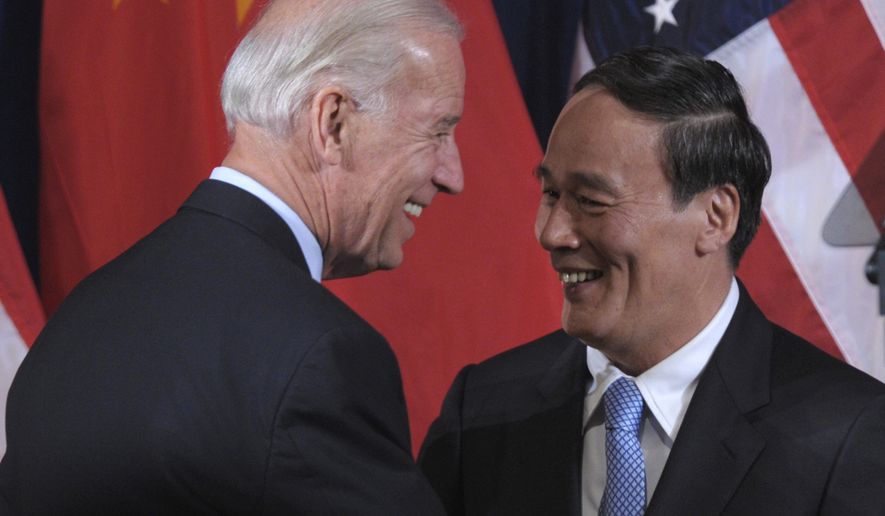WASHINGTON (AP) — Vice President Joseph R. Biden Jr. and Secretary of State Hillary Rodham Clinton both expressed concerns on Monday about the recent security crackdown in China.
Mr. Biden and Mrs. Clinton jointly raised the issue at the opening session of two days of high-level talks between the United States and China. They noted the large number of arrests in China, with the government detaining lawyers, activists, journalists and bloggers in a crackdown widely viewed as a Chinese response to forestall any Middle East-style democracy protests.
Mr. Biden said President Obama believed strongly that protecting fundamental rights and freedoms was “the best way to promote the long-term stability of any society.”
State Counselor Dai Bingguo, one of the leaders of the Chinese delegation, said in his remarks that China had made progress in the area of human rights.
The remarks by Mr. Biden, Mrs. Clinton and Mr. Dai were made during an opening ceremony of this year’s U.S.-China Strategic and Economic Dialogue. The two days of talks bring together top officials in the areas of economics and foreign policy.
The discussions began in 2006 during the Bush administration under then-Treasury Secretary Henry Paulson as a way to bring pressure on China to allow its currency rise in value against the dollar.
The Obama administration in 2009 expanded the talks to cover foreign policy as well as economic issues. This year for the first time, top military leaders from both nations are participating in an effort to ease tensions between the two nations that were heightened last year by U.S. arms sales to Taiwan.
During the opening session on economics, Treasury Secretary Timothy F. Geithner praised the efforts China had made in the economic area while saying more needs to be done.
He played down criticism he had made as recently as last week that China needed to move more quickly to allow its currency to rise in value against the dollar. American manufacturers contend the yuan is undervalued by as much as 40 percent, giving Chinese companies tremendous competitive advantages and costing millions of U.S. jobs.
Speaking in Treasury’s ornate Cash Room, Mr. Geithner said, “Over the past two years we have seen very promising changes in the overall direction of Chinese economic policy — towards a more flexible exchange rate, a growth strategy less reliant on exports and stronger protections for U.S. companies operating in and exporting to China.”
He said over the next two days of talks the two countries would “continue our dialogue on China’s move towards a more flexible exchange rate with more open capital markets.”
Last June, China announced that it was allowing the yuan to rise in value against the dollar, and since that time its value has increased by about 5 percent. Last week, Mr. Geithner said the United States would be pressing for a faster appreciation of the yuan.
American manufacturers contend that the Chinese currency still is undervalued by as much as 40 percent, and they complain that this gap gives Chinese companies a tremendous competitive advantage that has widened America’s trade deficit and cost millions of U.S. manufacturing jobs.
Mr. Geithner and Mrs. Clinton are leading the U.S. delegation, which also includes Federal Reserve Chairman Ben S. Bernanke and representatives from 16 U.S. government agencies.
The Chinese team is headed by Vice Premier Wang Qishan, a top economic policymaker, and by Mr. Dai. The leaders of the two delegations were scheduled to meet later Monday with Mr. Obama.
Analysts are not expecting major breakthroughs from the talks but hope the discussions will contribute to smoothing relations that were strained by last year’s arms sales. As part of that effort, Chinese President Hu Jintao visited Washington for a state visit in January.
China is facing threats of U.S. economic sanctions on goods shipped to America unless Beijing halts trade practices such as its currency undervaluation, which U.S. critics believe violate global trade rules.
For their part, the Chinese, who are America’s largest foreign creditor with $1.2 trillion in holdings of U.S. Treasury securities, are seeking assurances that Congress and the administration will resolve their differences and boost the U.S. borrowing limit before an August deadline, when, Mr. Geithner has said, he will run out of maneuvering room to pay America’s bills, including making interest payments on U.S. debt.




Please read our comment policy before commenting.